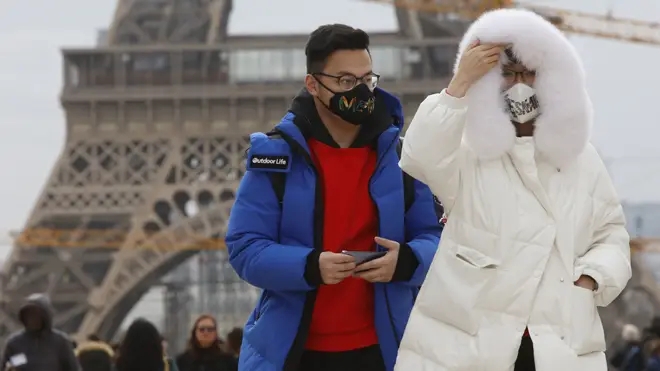
Matthew Wright 7am - 10am
29 February 2020, 17:07

French authorities have announced they are cancelling all public gatherings of more than 5,000 people in enclosed spaces as the country seeks to stop the spread of coronavirus.
A half-marathon in Paris has been cancelled, and the capital’s annual farm show will close a day early.
In Italy, five Serie A football matches have been postponed and a primary school assistant in Bonn, Germany also has the disease, causing 185 children to go into quarantine.
The list of countries touched by the illness has climbed to nearly 60 as Mexico, Belarus, Lithuania, New Zealand, Nigeria, Azerbaijan, Iceland and the Netherlands reported their first cases.
More than 84,000 people worldwide have contracted the illness, with deaths topping 2,800.
China, where the outbreak began in December, has seen a slowdown in new infections and on Saturday morning reported 427 new cases over the past 24 hours along with 47 additional deaths. The city at the epicentre of the outbreak, Wuhan, accounted for the bulk of both.
New cases in mainland China have held steady at under 500 for the past four days, almost all in Wuhan and surrounding Hubei province.
With the number of discharged patients now greatly exceeding those of new arrivals, Wuhan has more than 5,000 spare beds in 16 temporary treatment centres, the National Health Commission said.
Official figures on Saturday showed 1,726 patients had been released in Wuhan the day before, against just 420 new cases in the city.
READ MORE: Three more patients in England test positive for coronavirus
South Korea, the second hardest hit country, reported 813 new cases on Saturday - the highest daily jump since confirming its first patient in late January - raising its total to 3,150.
Emerging clusters in Italy and in Iran, which has had 43 deaths and 593 cases confirmed, have led to infections of people in other countries. France and Germany were also seeing increases, with dozens of infections.
Streets were deserted in the city of Sapporo on Japan's northernmost main island of Hokkaido, where a state of emergency was issued until mid-March.
Seventy cases - the largest from a single prefecture in Japan - have been detected in the island prefecture, where experts have raised concern about growing clusters of patients with unknown transmission routes.
Prime minister Shinzo Abe, who has been criticised for lacking leadership and crisis management, stepped up measures earlier this week, and urged school across the county to close until the end of March.
Tokyo Disneyland and Universal Studios Japan announced they would close, and events expected to attract tens of thousands of people were called off, including a concert series by K-pop group BTS.
Tourist arrivals in Thailand are down 50% compared with a year ago, and in Italy - which has reported 888 cases, the most of any country outside of Asia - hotel bookings are falling and premier Giuseppe Conte raised the spectre of recession.
The Swiss government banned events with more than 1,000 people, while at Cologne Cathedral in Germany, basins of holy water were emptied for fear of spreading germs.
Even in isolated North Korea, leader Kim Jong Un has called for stronger anti-virus efforts, saying there will be "serious consequences" if the illness spreads to the country.
The North has yet to report its first infection but it has been pushing a tough campaign it has described as a matter of "national existence". The country has shut down nearly all cross-border traffic, banned tourists, intensified screening at entry points and mobilised tens of thousands of health workers to monitor residents and isolate those with symptoms.
The head of the World Health Organisation on Friday announced that the risk of the virus spreading worldwide was "very high", while UN secretary-general Antonio Guterres said the "window of opportunity" for containing the virus was narrowing.
In a report published on Friday in the New England Journal of Medicine, Chinese health officials said the death rate from Covid-19 was 1.4%, based on 1,099 patients at more than 500 hospitals throughout China.
Assuming there are many more cases with no or very mild symptoms, the rate "may be considerably less than 1%", US health officials wrote in an editorial in the journal. That would make the virus more like a severe seasonal flu than a disease similar to its genetic cousins Sars or Mers.